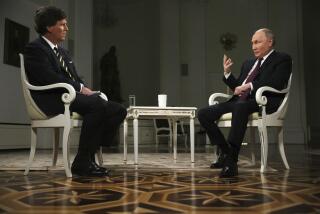No New Year’s TV Greetings, Soviets Tell U.S.
- Share via
MOSCOW — Soviet leader Mikhail S. Gorbachev believes that relations with the United States are so bad that he has refused to exchange televised New Year’s greetings with President Reagan, a Foreign Ministry spokesman said Tuesday.
A year ago, after the two leaders’ meeting at Geneva, Reagan appeared on Soviet television with a New Year’s message, and American television networks carried a similar message from Gorbachev.
Rejection of a U.S. proposal to repeat the exchange was announced by Gennady I. Gerasimov, chief spokesman for the Foreign Ministry, at a news briefing.
‘Obviously Disappointed’
A spokesman at the U.S. Embassy, Jaroslav Verner, said: “We are obviously disappointed. The decision is out of character with the glasnost (openness) campaign we’ve heard so much about. They missed an opportunity to get their point across.”
White House spokesman Larry Speakes said that since the Kremlin has denied Reagan the opportunity to address Soviet citizens via their own television, his New Year’s greetings to them will be broadcast into the Soviet Union by the Voice of America on Thursday.
In announcing the Soviet position, Gerasimov said: “Why should we create any illusions about our relations?
“Despite well-intentioned statements (on the American side), we have no basis for an exchange of such New Year’s messages.”
He cited three reasons for Gorbachev’s refusal to permit Reagan to appear on Soviet television.
The United States, he said, has backed away from positions on arms control taken by Reagan at the October summit meeting in Reykjavik, Iceland; has violated the SALT II treaty limiting nuclear weapons, and has refused to join a Soviet moratorium on nuclear tests.
“Reykjavik has shown the possibility of a breakthrough to peace,” Gerasimov added, “but we could not achieve it there.”
The Kremlin maintains that Reagan agreed during his talks with Gorbachev at the superpower summit to eliminate all long-range nuclear weapons, but the White House says Reagan tentatively agreed only to eliminate all intercontinental ballistic missiles.
Washington and Moscow, Gerasimov said, should make joint efforts to correct the situation so that there will be more of a basis for optimism.
In reviewing events of 1986, Gerasimov pictured the Soviet Union as presenting a series of proposals designed to eliminate nuclear weapons by the year 2000.
“Unfortunately,” he said, “the West is moving in the opposite direction by spiraling up the arms race.”
As examples, he mentioned the Reagan Administration’s plan to develop the Midgetman missile and new methods of basing intercontinental ballistic missiles.
White House spokesman Speakes said the United States had proposed the reciprocal New Year’s addresses, through its embassy in Moscow, on Dec. 22. He said it was rejected four days later.
Speakes, talking to reporters in Palm Springs, Calif., where the President is spending the year-end holiday, said an exchange of speeches would be “a symbolic effort.” In contrast to the Soviet view of superpower relations, he said, “Our view of the state of relations is that considerable progress was made at the Iceland summit.”
‘Considerable Progress’
Although there were significant U.S.-Soviet differences over the U.S. space-based missile defense system known as “Star Wars” at the close of the Iceland summit, “considerable progress” was made there on “people-to-people, scientific and cultural exchanges,” Speakes contended.
Last Jan. 1 was the first time a U.S. President had addressed the Soviet people on television since Richard M. Nixon did so during a Moscow summit in 1972.
In his remarks to the Soviet people at the beginning of this year, Reagan said: “Let’s work together to make it a year of peace. There is no better goal for 1986.”
Gorbachev, for his part, said the Soviet people were “dedicated to peace” and added that “the gap between us is still wide” because of a lack of trust.
Both spoke for five minutes. Reagan’s remarks were carried on the main evening news program. It is the most popular program on the network and is seen by an estimated 150 million people. Gorbachev’s message was aired simultaneously in the United States.
At Tuesday’s briefing, Gerasimov said a date for a possible Gorbachev visit to Japan might be set sometime after April.
Times staff writer James Gerstenzang, in Palm Springs, contributed to this article.
More to Read
Sign up for Essential California
The most important California stories and recommendations in your inbox every morning.
You may occasionally receive promotional content from the Los Angeles Times.













